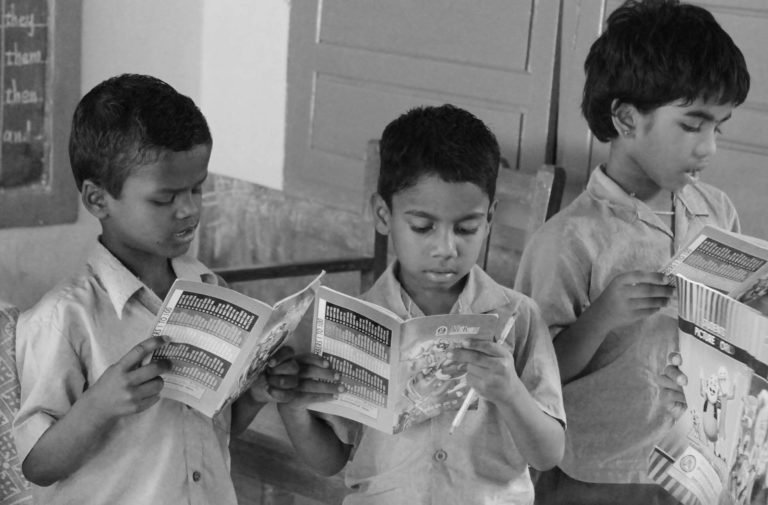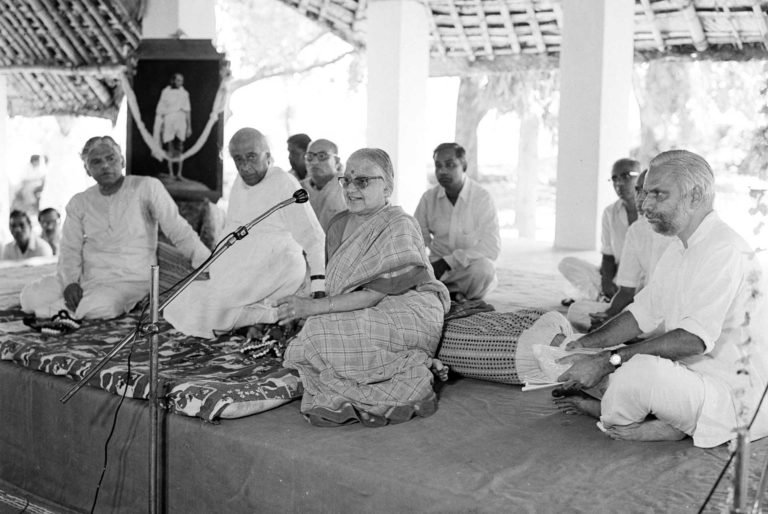Village Extension Program
Building and empowering sustainable communities
In the 1950s, Shri C Rajagopalachari, the then Chief Minister of Tamil Nadu, allotted the area near the Periyar Irrigation Project to Gandhigram for implementing programs that involved the participation of communities around it and benefited them. Seizing the opportunity, Dr. Soundram introduced several community development strategies like need assessment techniques and participatory learning methods.
She also initiated an experimental project at Athoor for community participation that was funded by the Ford Foundation. The remarkable project ran successfully between 1959 and 1964 and formed the basis of the Village Extension Program that was formally started in 1999 and continues to support rural communities till date.
The extension activities reach 170 villages in the area. 715 houses have been built under the program to provide shelter to the rural poor. 400 biogas plants have been installed and 356 chulhas or earthen stoves have been improved, to reduce the possibility of respiratory illnesses among rural women.
Our village extension wing is currently operational in Athoor and Nilakottai blocks in Dindigul and Andipatti block of Theni district in Tamil Nadu. As a part of the extension activities, 1260 Self-Help Groups (SHGs) for both men and women are supported under various schemes. Many of the SHGs act as production, sales and service units. 37 non-profit federations have also been established at Panchayat levels. These organisations act as support systems for the SHGs, enabling them to take direct control of their governance and activities. 10 people have been trained and appointed for the effective management of the federations.
At the behest of the Government of Tamil Nadu and its departments like District Rural Development Agencies, Women Development Corporation as well as NGOs, Gandhigram conducts skill development training programs. Natural dyeing, neem oil extraction, making of puppets, sanitary napkins, leaf plates, jute bags, envelopes, sandalwood garlands and banana fibre baskets are some of the areas where training is provided.
Through these efforts, we hope to enhance the employability of individuals and enable them to cater to the demands of the market. At present around 3000 SHG members have become entrepreneurs and are earning money. Aside from their own initiatives, the members of SHGs are also encouraged to play an active role and contribute to weaving the social and political fabric in their respective villages. They enthusiastically participate in the grama sabhas convened by their Panchayats. 30 SHG members have also been elected as Panchayat functionaries.
Apart from facilitating SHGs, we have also taken up several other outreach programs. These include:
Water & Sanitation projects:
For more than a decade, our Water and Sanitation Program has been contributing to bringing about sustainable improvement in health and well-being of vulnerable communities. The focus areas of the program include Athoor, Nilakottai, Vathalagundu, Reddiyarchatram and Vadamadurai blocks of Dindigul district, covering 111 Panchayats. Based on our experiences over the years, efforts are being made to carry out several activities under the new Swachh Bharath Mission (SBM) implemented by the Dindigul District Administration. Arghyam, a charitable foundation that aims at providing safe and sustainable water for all, supported Gandhigram Trust from April 2014 to March 2018. By taking up the role of a resource agency, it facilitated motivation through mass awareness, capacity building and facilitating for construction of Individual household latrines, monitoring through convergence of various stakeholders.
Furthermore, we have been able to provide financial assistance to 2000 minority and marginalized communities through our Revolving Fund Strategy, for the construction of Individual Household Latrine (IHHL) at village level.
In 2017, Gandhigram Trust was awarded “Best Motivator” for its performance in the Swachh Bharat Mission by the district administration. We were able to facilitate the construction of 42000 household toilets and the formation of 367 School health committees in primary and middle schools for promoting better health and hygiene practices,
Watershed development project
As a part of the Rashtriya Swasthya Bima Yojana assisted watershed project, Gandhigram has taken up activities that would enhance rural livelihoods and rural employment opportunities. It covers 2,369 hectares of land and a population of 16,937.
School WASH project at Rameswaram
Ramanathapuram district, one among the two aspiration districts in Tamil Nadu as categorized by NITI Aayog, is the base for our project entitled, “Promoting Sustainability of WASH (Water, Sanitation and Hygiene) facilities and Child-Centred Governance in the Schools of Rameswaram”. The project is funded by National Stock Exchange (NSE) Foundation, Mumbai. The program aims at turning 37 schools into clean and disease-free spaces by promoting sanitation among the school going children, building capacity of stakeholders on sanitation and hygiene and supporting the district administration to achieve open defecation free areas.
The two major components of the project are retrofitting WASH infrastructure facilities in the schools and Behavioural Change Communication on sanitation and hygiene. The project, in consultation with the school education department, has identified 37 government run schools for intervention. During the initial days of the project, Gandhigram Trust prepared detailed project reports on WASH in all the identified schools. This report, in addition to guiding the team to make specific interventions as a micro-planning tool, also acts a baseline for outcome indicators.
School WASH project in Dindigul district
The WASH project has also been implemented in schools in four blocks of Athoor, Nilakottai, Vathalagundu and Reddiyarchatram in Dindigul district,
with the support of Redington Foundation, Chennai. We have also conducted Knowledge, Aptitude and Practice studies to understand ways to make a visible impact on the health, hygiene and the school environment of rural school children. By improving both their health and hygiene practices, and also those of their families and communities, we can pave the way for a new generation of healthy children who also will care and nurture their environment. Based on the Knowledge, Attitude and Practice (KAP) study 2019, 82 primary, middle, high and higher secondary schools in Athoor district are covered by the School WASH program





